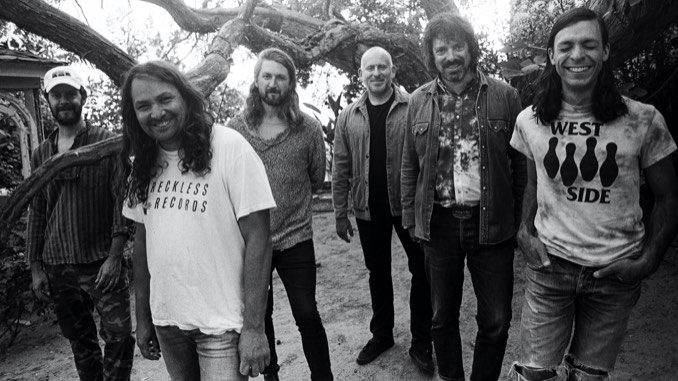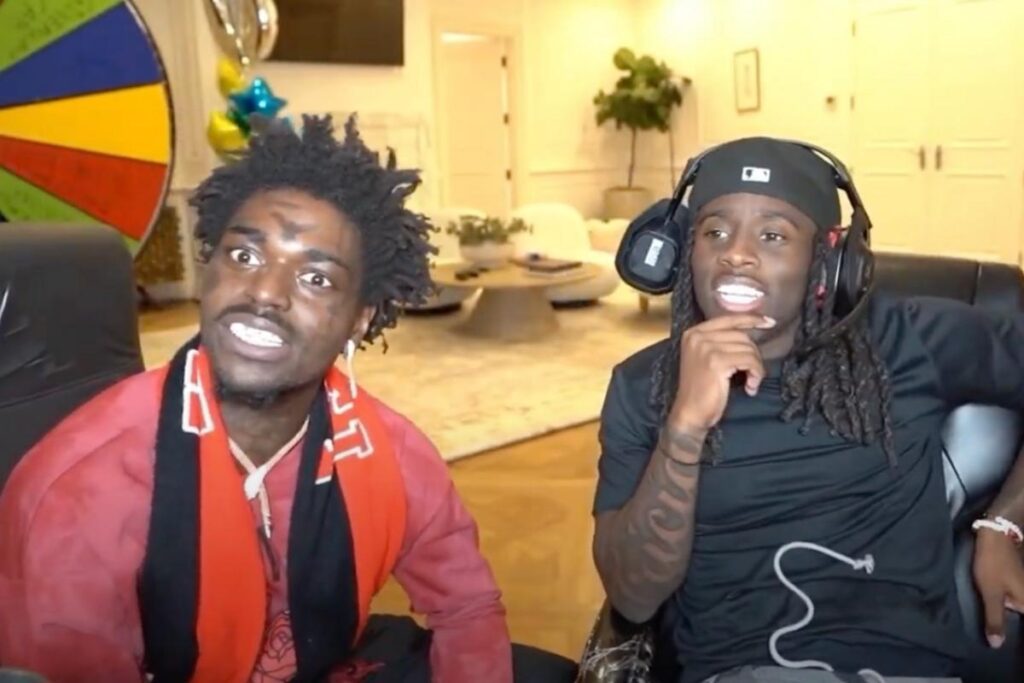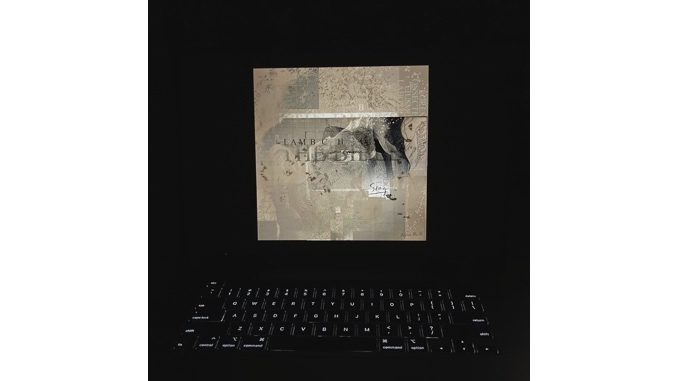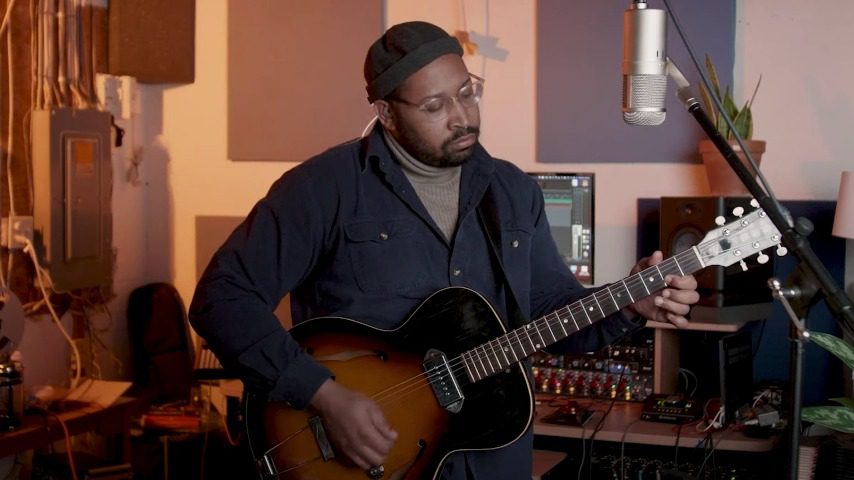Bonafide purveyors of shoegaze and staples of dad rock, The War on Drugs are a walking kush coma, cut on atmospheric echoes, roaring synths and guitars cracked out of their minds. When Adam Granduciel and Kurt Vile formed the band in Philadelphia in 2005, it was after they’d come into each other’s orbits and bonded over Bob Dylan. The War on Drugs live and die by Dylan, in both Granduciel’s nasally vocals and the band’s tendency to make songs that reach optimistically toward the 10-minute mark.
The membership has been a revolving door since its inception, but is currently settled on an amalgamation of Granduciel, Dave Hartley, Anthony LaMarca, Robbie Bennett, Charlie Hall and Jon Natchez. When Vile left the band in 2008, instead of letting his absence deplete them of their creative chemistry, they only got better—developing a penchant for maximalist psych-rock and fine-tuning what would become their signature sound.
Slave Ambient
, released a decade ago this year, is where the band officially found their footing, to the point where their 2008 debut, Wagonwheel Blues, sounds uncharacteristically industrial and unlike any other War on Drugs project. Though Slave Ambient doesn’t clear the bar its successors have set, it’s still a perfect bridge album between the rawness of Wagonwheel and the honed-in surrealism of the critically revered Lost in the Dream. After a three-album partnership (Wagonwheel Blues, Slave Ambient, Lost in the Dream) with esteemed indie label Secretly Canadian, the band moved to Atlantic Records ahead of 2017’s A Deeper Understanding.
The move brought forth a bigger budget for Granduciel to do his thing and bigger distribution numbers for a growing audience—cemented by the record’s peak at #10 on the Billboard 200. Lost in the Dream had previously peaked at #26 on the Billboard 200 and pointed to an uptick in acclaim, which was cemented when A Deeper Understanding deservedly won a Grammy for Best Rock Album in 2018.
I Don’t Live Here Anymore
—the band’s first record in four years, released last week—builds on the technical precision of its predecessor, signaling a continuation of the stranglehold they currently have on rock and roll. In early 2022, many will pack themselves into various venues across the country to watch Granduciel and company resuscitate their hits of old and christen the jams of new on tour. But for now, here are The War on Drugs’ 10 best songs, ranked, to hold us over.
10. “It’s Your Destiny”
Slave Ambient is the last War on Drugs record to feature Kurt Vile, and “It’s Your Destiny” is one of two songs he plays on—making it a perfect send-off track for the songwriter who’d go on to head The Violators and make brilliant collaborations with Courtney Barnett and John Prine. But where other Slave Ambient tracks merely pawed at the promise of the sound that would be fully realized on Lost in the Dream, “It’s Your Destiny” is a precursor to the glow of what we now consider to be The War on Drugs’ sonic aesthetic. It’s a bit woozier than their other cuts, the guitars are mega-dreamy and Granduciel has this Dylan-esque drawl that sometimes drawls too cheekily—but the song taps into the theme of future glory that the rest of Slave Ambient plays around with, which would get shelved for more introspective, reflective meditations on the band’s next two records.
9. “Lost in the Dream”
“Love’s the key to the things that you see / And don’t mind chasing,” Granduciel cries out halfway through “Lost in the Dream.” Hearing him like this—day-drunk on the hope of romance in the name of making certain sacrifices, against the songbird of a harmonica and an organ—is like hearing Dylan on the moon, which is exactly what Granduciel and Vile set out to be back in 2005. Lost in the Dream is the record where critics decided to make The War on Drugs a categorical “heartland rock” band, and if there were ever better evidence of that being true, it’s the title track—one of the few moments on the record that doesn’t sound the way a streak of a subway tunnel looks from inside the train car. Instead, the song leans into its own quiet just long enough so that we can hear the balance: a give-and-go between guitars and pianos executed with precision, Granduciel’s vocals coming through clearer than ever and him not living inside the excess of his performance a second too long.
8. “Holding On”
I have certain biases, and Meg Duffy’s rock stardom is certainly one of them. Their slide guitar performance on “Holding On” is still one of the best opening riffs from this millennium—and the rest of the track lives up to it. The song’s orgasmic finale—where the band comes together, with a celeste, glockenspiel and six-voice Oberheim Xpander analog synth in tow—capitalizes on Granduciel’s fuzzy vocals and the masterclass brevity of his guitar riffs. It’s five-and-a-half minutes of reflective, self-interrogating lyrics balanced with a clean, racing instrumental. Two minutes in, Granduciel sings, “Never meant to bring my pain to the front and into your life,” while the guitars maintain their pace and Duffy’s slide ruptures the stratosphere someplace high above it.
7. “Under the Pressure”
A lot of folks came onto the Lost in the Dream opening track by way of its inclusion in the season five finale of BoJack Horseman, and that’s one of the things I love most about how we discover and share music. “Under the Pressure” is versatility radiating, a track that’s as much of an inspirational fit for workout playlists as it is a real cry-your-eyes-out-in-the-shower downer. As far as Side 1/Track 1s are concerned, “Under the Pressure” comes out of the gate at an 11. The piano runs like a metronome, keeping time throughout and holding pace as textures of guitar and feedback leave imprints all over the landscape of the song’s near-nine-minute runtime. Granduciel sings, “But a dream like this gets wasted / Without you,” in the middle of a tense build-up, which eventually spills outward like an an avalanche of static.
6. “Change”
It seems like this last decade, from the grand-slam birth of Slave Ambient to the long-awaited return of I Don’t Live Here Anymore, The War on Drugs have been building towards “Change”—a faraway-gazing orchestra of heavyweight arrangements and speculative lyrics. Granduciel sings, “Maybe I was born too late / For this lonely freedom fight / Maybe I was born in the wrong way,” in his strongest vocal outing yet. Where A Deeper Understanding showcased eccentricities built from a restrained, meditative energy, I Don’t Live Here Anymore is an electric upheaval hellbent on showing growth. On “Change,” The War on Drugs do nothing we expect them to. There are no comprehensive fireworks; no swells or explosions; no solos stretched too thin. The tune carries a singular slow burn and even gentleness from start to finish. It’s a masterclass in its own restraint and composure; a landscape worth coming back to.
5. “An Ocean in Between the Waves”
The War on Drugs are just as good at creating tense swells of fire as they are mellowed-out trips. “An Ocean in Between the Waves” doesn’t ride the operatic grooves of its siblings on Lost in the Dream. It starts with a machine gun snare roll and keeps its foot on the gas. On a record sometimes defined by how brilliant and emotional its synths are, “An Ocean in Between the Waves” is bare in that respect. Instead, it’s a love song identifying as a full-blown guitar anthem, with Granduciel’s melancholic lyrics shouldering the emotional load. “Just wanna lay in the moonlight / And see the light shine in / See you in the outline / It never gets too dark to find,” he sings in the fourth verse, all of us witnesses to a guy just trying to get back on even footing with everyone he loves.
4. “In Chains”
A Deeper Understanding is unfairly front-loaded, but the back half undeniably kicks ass for a number of reasons—one being the existence of “In Chains,” a seven-minute meld of ‘80s piano, synths and strobing guitar that roars atop the famous War on Drugs atmospheric echo. One of the best moments in the band’s entire discography comes at the 2:45 mark, when Granduciel’s voice kicks up and the band lose their minds, unleashing a mystifying crescendo long before even hitting the song’s halfway point. Other tracks on the record—like “Pain,” “Strangest Thing” and “Holding On”—flaunt their glittering moments immediately. But “In Chains” is bold in how it makes us wait for the punchline. “We can try to learn and make it through / Come out the other side,” Granduciel opaquely tells us. The band is patient and confident in how they layer their work. It’s been four years and we’re not only still peeling back parts of “In Chains,” but we are also discovering new beauty in the parts of it we’ve undone.
3. “I Don’t Live Here Anymore”
When surveying an artist’s discography, retrospect plays a big role in the outcome. But with “I Don’t Live Here Anymore,” the track is built off lyrics about getting older, accepting yourself as such and refusing to dwell on it. “I’m gonna make it to the place I need to go / We’re all just walking through this darkness on our own,” Granduciel sings atop a river of gospel backing vocals—provided by Lucius—and synths like those on OMD’s “If You Leave” sparkling beneath. His love for Dylan rears its head again, as he opens the track with a nod to the “creature void of form” of “Shelter from the Storm” and later explicitly references “Desolation Row.” Granduciel and company play hard into their fine-tuned eccentricities, showcasing a new confidence in letting the song’s gorgeous melody unravel on its own, rather than forcing an erupting guitar solo onto it. After four years away, just when you thought they couldn’t do this psych-rock thing any better than they did on A Deeper Understanding, The War on Drugs return to us bearing gifts of celebrations and daydreams, riffs worthy of a hundred sold-out arenas and sweeping pop hooks magnetic as all get out.
2. “Red Eyes”
Content creators used to dance to this song on Vine—which is why it’s one of the first instances I remember discovering a song on social media that would become a touchstone of my own tastes. “Red Eyes” was Lost in the Dream’s first single, and it set the tone for the entire project. The ethos of the album came from a lonely, depressive state Granduciel found himself in while relentlessly touring in support of Slave Ambient, and “Red Eyes” articulates the psychedelic, anthem rock version of the “alone in the corner at a party” meme that circulates on Twitter and Instagram daily. “No one sees me right here waiting / They don’t mind that I’m here,” he sings. The legendary, ear-melting breakdown gets so cleverly hinted at throughout the song’s first act, and the band lets it patiently linger beneath a fusion of Granduciel’s nasally tenor, ARP string synth and Hagstrom 12-string. The result is an eruption, or Rod Stewart’s “Young Turks” on acid; the song that should have been playing in the background when Michael fell from the sky in Grand Theft Auto V. Six years later and that signature, piano-driven hook, intoxicating and brilliant, still rushes in at the 3:35 mark and thrashes like countless bodies moving in unison on a dance floor.
1. “Thinking of a Place”
A friend once told me that no one wants to listen to any song that’s closer to 20 minutes long than it is to zero, but I say all hail the sleepwalking, long-winded glitz and glam of stadium rock. Playing it safe means nothing to The War on Drugs, and “Thinking of a Place,” the first single from A Deeper Understanding, has the sonic gusto of an album closer, but the patience of an opener—despite being placed in the middle of the LP. It’s Granduciel’s “Sad-Eyed Lady of the Lowlands,” except he doesn’t showcase the same lyrical prowess—and he doesn’t need to—as Dylan, who could kill a dozen minutes with imagery so finely layered, it’d make your head spin. Granduciel prefers his songs to burst with glowing synths instead of stacked vocals—and he does it impeccably. So, yes, give me all your four-minute breakdowns and smorgasbords of guitar solos wet like velvet, that stink of concert lighters and long drives. Granduciel sings, “Come and take my hand, babe / There’s a turn in the road that we’ve been taking / Let it set you free,” at the beginning of the song’s second act—and it’s as uplifting as he’ll ever get. Granduciel gives power to the momentum of the band’s instrumentation, where a unique urgency of recollection plays out through patient, lyrically vague verses rotating in motion with ambient sections and clean guitar solos. “Thinking of a Place” is nostalgic for songs written like novels that unravel sitcom-episode-length runtimes but outmuscle that nostalgia with intoxicating, synth-driven instrumentals. It’s a dynamic song, sung by someone who doesn’t have a concrete final answer to all of the hypnotic what-ifs in life, but likes to show his work.
Matt Mitchell is a writer living in Columbus, Ohio. His writing can be found now, or soon, in Pitchfork, Bandcamp, Paste, LitHub and elsewhere. Find him on Twitter @matt_mitchell48.
Revisit The War on Drugs’ 2010 Daytrotter session below.




